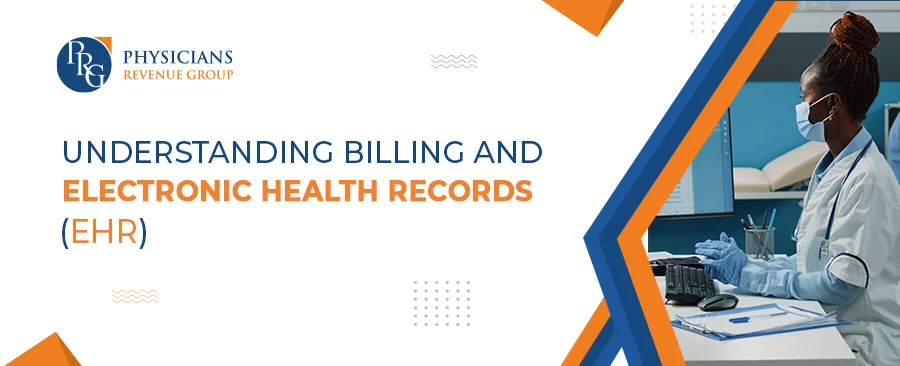
Email: info@prgmd.com | Call: +1 (630) 242-6474
Business hours: 9:00 to 5:00 | Monday to Friday
Email: info@prgmd.com | Call: +1 (630) 242-6474
Business hours: 9:00 to 5:00 | Monday to Friday

Table of Contents
ToggleUnderstanding billing and electronic health records go hand-in-hand. EHRs are digital versions of patient charts. EHR systems are lifelines for medical billing services as these contain the treatment and medical histories of patients. However, while understanding billing in healthcare, we also see that EHRs go beyond the standard clinical data.
An EHR system can act as the broader view of a patient’s care – EHRs are an essential part of healthcare IT and can comprise of:
A lot of paperwork is involved in healthcare billing procedures, and ideally, there should be a dedicated team doing this. It can be tiresome, yet again, it is entirely possible to minimize this work by using integrated billing systems.
Integrated systems aid staff from frustrations of healthcare billing and even boost:
Integrating EHRs and billing reduces human errors and other mistakes. It can also save a provider practice from claim rejections and denials.
Specialized EHR technologies help healthcare practices leverage the benefits of interoperability at high levels. The integrations of EHR systems and billing facilitate data sharing among practitioners and providers working on the same patient.
Furthermore, information that is non-sensitive can also be accessed by third parties for improving patient care echelons.
In a digitally altered healthcare world with automated processes, healthcare billing is not left with its own devices. EHR based healthcare billing solutions can reduce the sheer volume of exhausting paperwork and increase the efficacy of operations by automating procedures.
What’s more, automation in medical billing also speeds up the entire process and reduces the probability of human errors that can otherwise result in claim denials and rejections.
While probing and understanding billing, you will agree when we say that the billing processes are stressful for patients and can affect their satisfaction levels.
However, while implementing EHR-integrated billing systems, patient insurance plan verification can be made much faster. Furthermore, the waiting times for treatment approvals can be further cut.
The probability of surprise billing can also be avoided by letting patients know what exactly their payers shall cover. Doing so creates convenience for both patients and providers.
Understanding billing services in healthcare also entails leveraging the use of improved analytics. The essential decisions for the improvements and growth of the client-provider practices can be made by taking advantage of integrated EHR billing systems.
It is pertinent to note that not all EHR systems can handle medical billing processes. Integration of EHR systems without understanding billing scopes and the capability of EHRs can ruin everything.
The billing-centric EHRs can assist in simplifying a provider’s billing operations without disturbing the other patient data.
To safeguard data from loss, data migration is essential for improving the interoperability sharing of medical history. Data migration additionally reduces errors.
It is vital to embrace the fact that while the staff is trained to perform their duties, only some are technologically advanced. Thus, healthcare providers must facilitate their teams to effectively understand the aspects of EHR medical billing.
The EHRs, or the electronic health record systems, are digital versions of a patient paper chart.
The EHR systems facilitate physicians to document any patient-doctor interactions. Furthermore, EHRs also enable viewing the medical histories of patients in addition to their insurance information.
The EHR implementation process entails the planning and integrating of the EHR system with the components of a healthcare practice.
Share:
Categories
Recently Added

What is an ABN in medical billing?

What does a Clearinghouse do During Claims Submission?

What is EOR in Medical Billing?
We Would Love to Assist You!
We treat your data confidentially and don’t share any information with a third party.